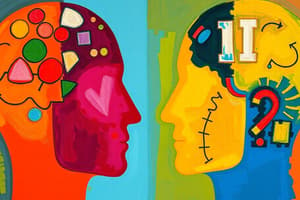Podcast
Questions and Answers
The Sunk Costs Errors involve recognizing that current actions can impact past events.
The Sunk Costs Errors involve recognizing that current actions can impact past events.
False (B)
The Confirmation Bias helps individuals to seek out information that contradicts their previous decisions.
The Confirmation Bias helps individuals to seek out information that contradicts their previous decisions.
False (B)
Overconfidence Bias leads individuals to hold uniquely pessimistic views about their capabilities and performance.
Overconfidence Bias leads individuals to hold uniquely pessimistic views about their capabilities and performance.
False (B)
The Framing Bias can affect decision making by emphasizing certain aspects of a situation while ignoring others.
The Framing Bias can affect decision making by emphasizing certain aspects of a situation while ignoring others.
The Availability Bias can impair decision making due to a focus on past events rather than recent experiences.
The Availability Bias can impair decision making due to a focus on past events rather than recent experiences.
The Immediate Gratification Bias leads individuals to choose alternatives that provide delayed rewards.
The Immediate Gratification Bias leads individuals to choose alternatives that provide delayed rewards.
Self-Serving Bias refers to the tendency to take responsibility for failures while crediting successes to external factors.
Self-Serving Bias refers to the tendency to take responsibility for failures while crediting successes to external factors.
The Anchoring Effect can cause individuals to disregard initial information when making decisions.
The Anchoring Effect can cause individuals to disregard initial information when making decisions.
Representation Bias involves correctly identifying unique situations and treating them as distinct.
Representation Bias involves correctly identifying unique situations and treating them as distinct.
Hindsight Bias occurs when individuals believe they could have predicted an outcome before knowing it.
Hindsight Bias occurs when individuals believe they could have predicted an outcome before knowing it.
Flashcards
Heuristics
Heuristics
Using simple rules or shortcuts to make decisions quickly, even if they aren't always the most accurate.
Overconfidence Bias
Overconfidence Bias
Thinking you're better than you actually are, often leading to poor decisions.
Immediate Gratification Bias
Immediate Gratification Bias
Choosing immediate rewards over long-term benefits, even if it's not the best choice in the long run.
Anchoring Effect
Anchoring Effect
Signup and view all the flashcards
Confirmation Bias
Confirmation Bias
Signup and view all the flashcards
Sunk Costs Error
Sunk Costs Error
Signup and view all the flashcards
Self-Serving Bias
Self-Serving Bias
Signup and view all the flashcards
Hindsight Bias
Hindsight Bias
Signup and view all the flashcards
Study Notes
Decision-Making Errors and Biases
- Heuristics: Using simple rules of thumb to simplify decision-making.
- Overconfidence Bias: Having overly positive views of oneself and one's abilities, holding unrealistically positive views of oneself and one's performance.
- Immediate Gratification Bias: Choosing options offering immediate rewards over those with delayed but potentially greater rewards, choosing alternatives that offer immediate rewards and that to avoid immediate costs.
- Anchoring Effect: Focusing too heavily on initial information, ignoring later information, fixating on initial information and ignoring subsequent information.
- Selective Perception Bias: Interpreting events based on pre-existing biases, selecting organizing and interpreting events based on the decision maker’s biased perceptions.
- Confirmation Bias: Seeking information supporting existing beliefs and ignoring contradictory information, seeking out information that reaffirms past choices and discounting contradictory information.
- Framing Bias: Focusing on specific aspects of a situation while ignoring others, selecting and highlighting certain aspects of a situation while ignoring other aspects.
- Availability Bias: Letting recent events impact decisions, potentially leading to poor objectivity, losing decision making objectivity by focusing on the most recent events.
- Representation Bias: Drawing incorrect analogies and assuming similar situations are identical when they aren't, drawing analogies and seeing identical situations when none exist.
- Randomness Bias: Assigning meaning to random events, creating unfounded meaning out of random events.
- Sunk Cost Error: Continuing with a course of action due to past investments, even if it's not beneficial in the future, forgetting that current actions cannot influence past events and relate only to future consequences.
- Self-Serving Bias: Attributing successes to internal factors and failures to external factors, taking quick credit for successes and blaming outside factors for failures.
- Hindsight Bias: Believing an event was predictable after it has already occurred, mistakenly believing that an event could have been predicted once the actual outcome is known (after-the-fact).
Studying That Suits You
Use AI to generate personalized quizzes and flashcards to suit your learning preferences.




